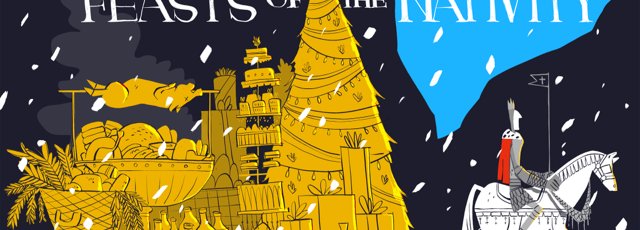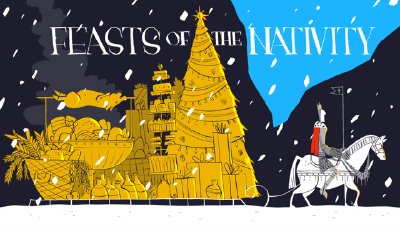


Feasts of the Nativity
The Wealth of Wenceslas
December 26, 2021 • Rev. Joshua Smith
The Feasthood of All Believers Merry Christmas Eve, friends. For much of my early adulthood, my father and one of my sisters had jobs that prevented us from celebrating Christmas together on December 25. The day after was much easier to request off, and the arrangement left me and my other sister free to garner favor with our own sets of future and present in-laws by handing the traditional holiday over to them. So, the day after Christmas, we Smiths typically reserve the day to cook and consume an elaborate breakfast feast before my siblings, parents, and a few grands watch the rapidly multiplying crop of cousins joyfully destroy wrapping paper and reveal the secrets within. The best gift, of course, has been that for the last couple of years we’ve had five generations present! My eccentricities are established enough in the family that they sometimes become ritualized even when there’s almost no intentionality to them. I think I started calling our holiday Boxing Day simply because that’s what was printed on the calendar in the space where I wrote in the even more obscure “Smithmas.” Now we all refer to the event interchangeably as both. There had been speculation as to the origin of the holiday known as “Boxing Day,” but no one ever bothered looking it up, since in those days the internet was not a thing one kept in one’s pocket. Speculations ranged from it being the traditional Canadian day for a formalized fight with siblings over the rightful ownership of contested gifts, to a postal service holiday after the grueling season. In fact, even looking it up doesn’t offer much more clarity. It does, however, add a theory we hadn’t considered, and which seems to be the more likely origin. All over the world from time out of mind, December 26 is designated as the Feast of St. Stephen: the first martyr for the faith, and first recorded deacon of the church. His task, along with six other faithful men, was to justly administrate the distribution of food to widows in the church. So, for generations, the day after Christmas has offered a perfect opportunity for faithful to box up the excess from the previous day of feasting and deliver it to the poor. Boxing Day is properly a very practical celebration of St. Stephen’s Day. As December 26 falls on a Sunday this year, before I head to my parents’ house for Boxing Day I’ll be in worship considering the life and death of St. Stephen. We’ll also remember Wenceslas, the man who honored Stephen’s feast day so faithfully, we still sing a carol about him a thousand years later. Both were simply following in the footsteps of the greatest table-setting King of them all. So, I hope you can be with us this Sunday as we all continue to stretch our imagination of what a good and godly feast can and ought to look like, regardless of its name or date. - josh
A Primer To Party Planning
December 19, 2021 • Rev. James M. Holland • Luke 14:12–14
A Primer for Party Planning I know what you are thinking as you look at that title. Yeah, that is just Jim. He is always a party waiting to happen. He is a seven on the Enneagram, and then a little rolling of the eyes. And yet……What if Jesus set up throwing parties as an expectation? What if setting tables was at the heart of the hospitality of God and the Counterculture kingdom he was bringing? Because, shockingly, it would seem so. In our text Sunday, the exhortation is—when, not if, you throw a party! Curiously, as we will see next week (and I will not steal Josh’s thunder), the whole call of the ministry of deacons is cast around what? Setting tables. So, Jesus gives us a primer for planning our parties, complete with instructions to the host about the guest list. This is what is shocking. He gives these instructions to a “religious leader.” The problem with Israel when Jesus arrives on the scene is not that Israel didn’t believe in throwing banquets—no, they were shaped by them and knew a grand feast was their future. But their banquets had become anti-culture—only people like us, only our peers and those we respect will be at our tables. Jesus drops a bomb on their narrow views and shows us a guest list that reflects the very gospel that would transform the world. Curious? I hope so. We are in the season of parties, banquets, and special programs, and gathering people is at the heart of what it means to be human. And Jesus shows us a more excellent way with a huge expectation—you will be blessed! That is, happy, knowing deep satisfaction. And in a world where these things increasingly elude us, how great is that?! So, join us Sunday, the fourth week of Advent, as we consider how the most mundane thing we do (eating) can reflect the cross—love, that is, life laid down. Glory, Jim
Feasting At The Edge of Doom
December 12, 2021 • Rev. James M. Holland • Nehemiah 8:8–12
Feasting on the Edge of Doom That sounds melodramatic, doesn’t it? And yet, as we make our way through the various Feasts of the Nativity, we are forced to reckon with this. While many of us still might think this whole idea of feasting frivolous or at least something of secondary importance – something only to be done if perhaps we have time and means – scripture and our own traditions of spiritual formation will beg to differ. I was rebuked one time for this kind of thinking myself, early on in our life of St. Patrick, when someone asked me after worship, “Why do you sometimes shorten the communion liturgy?” I replied, “Well, I am just trying to not go over too much.” He replied, “Why don’t you shorten your sermon?” Ouch! There it is, my latent gnosticism was rebuked, and rightly so. It is hard for us as Presbyterians to really embrace that we are formed by “table” as much as “word.” But what if “practices” are as formative as just getting more Biblical information? We sort of see this in our text for this week. When God is reforming his people after exile, the people of God listen as God’s Word is read and they are cut to the quick. After this, they are exhorted not to go home and reflect in silence or grovel like worms. Rather, they are commanded to feast on the finest of things in joy and not gloom, in community, sharing with those who couldn’t provide. I would argue, the latter was as formative as the former. While the Word does form and inform our practices, if we neglect the practices, we do so to our own spiritual hurt. While many of us suppose that the key to holiness is more information, the Bible and our spiritual formation directors, time out of mind, keep reminding us of practices and habits we do over and over, which don’t offer any new information, but do promise spiritual formation. I mean, what is the essence of holiness but to love God, love your neighbor, and love life? Word and habit seek to help us here. In our text this week, it seems the best way to be formed as the people of God, especially while at the edge of ruin, is to throw a feast that both brings joy into the gloom and is also radiates light in the darkness. Still skeptical? Yeah, it sounds too material, too frivolous, and not spiritual enough. But join me Sunday as we travel to the edge of ruin and see God forming his people around a feast of the finest of things. Blessings, Jim
Feasting In Hope
November 28, 2021 • Rev. James M. Holland • Isaiah 25:6–9
Feasting in Hope I had a couple of huge feasts recently. Both were for my birthday. One was thrown by my wife and had most of the begats and extended family. It was glorious and the food was amazing. My son-in-law cooked a prime rib over open flame for 4 hours and served it with a center of 125—perfection. My favorite cake—German Chocolate—graciously adorned the center piece as the hallowed birthday song was sung. The other was thrown by my staff as they took me to a glorious restaurant I hadn’t been to before. My Community Group also made me a German Chocolate cake, as well. (You might have guessed, it is my favorite!) What was true of all these events was that food was more than food. It was nourishment, of course, but who thinks about that on such occasions? It was love, family, belonging… and, of course, delicious! Some would think this extravagant or maybe even unspiritual and yet, as Tim Chester says in his book, A Meal with Jesus: “Jesus is known through his catering”. Chester says this because, as he points out in Luke’s gospel, Jesus is always either going to a feast, coming from a feast, or throwing a feast. We are now starting the Christian new year with the season of Advent which culminates in the Feast of the Nativity on Christmas Day. So, what are we to make of it? How do we keep our scattered feasts well? Make no mistake, feast we will, if we are human. The question is, will our feast look like what God has in mind or what our culture is prescribing? To help train our sensibilities, we will be looking at 5 feasts during this season of Advent. (We have an extra one because Christmas is on Saturday and the elven magic will still be upon us that Sunday!) This Sunday we start by looking at the whole idea that our future is a feast and considering how that idea is unique to Christianity and, as such, shapes both our present and our future. Don’t believe me? Join us on Sunday and we will talk about it! Also, as of this morning we have completed our first 3 year cycle in the Soul Room. Which means if you started with us from the beginning, you have now prayed through the whole Bible! The new cycle will begin on Monday. If you haven’t done this before, this is a good time to join us as we pray scripture back to God in a community. Blessings, Jim


